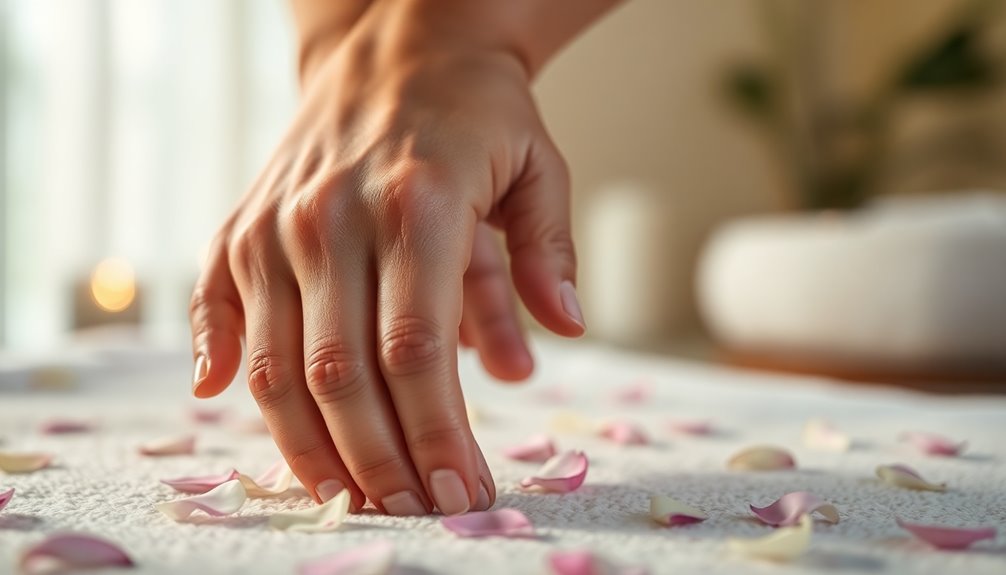Friction intercourse involves the rubbing of genital surfaces to create stimulation. While it can be pleasurable, it often leads to discomfort due to insufficient lubrication, which increases friction. This can result in irritation, burning sensations, or even pain. Proper lubrication is essential for a comfortable experience and can help prevent issues like microscopic tears. To learn more about the factors that contribute to discomfort and ways to enhance your experience, keep exploring the topic!
Key Takeaways
- Friction intercourse involves genital surfaces rubbing together, stimulating through physical contact without penetration.
- It can lead to discomfort due to insufficient lubrication, causing irritation or a burning sensation.
- Water-based lubricants are essential to reduce friction and enhance comfort during friction intercourse.
- Persistent pain or unusual symptoms during friction intercourse should prompt medical consultation for underlying health issues.
- Open communication with partners about comfort and preferences is crucial for a positive sexual experience.
Understanding Friction Intercourse

Friction intercourse is a form of sexual activity characterized by the rubbing of genital surfaces, creating stimulation primarily through physical contact. While it can be pleasurable, it may lead to discomfort during sex, such as a burning sensation or vulvar irritation.
Insufficient natural lubrication often causes these issues, which can arise from hormonal changes, infections, or lack of arousal. To enhance your experience, consider using water-based lubricants to reduce friction and prevent discomfort.
It's also essential to maintain open communication with partners about comfort levels to promote sexual health. If you're experiencing persistent discomfort, don't hesitate to consult a healthcare provider for advice tailored to your needs.
Understanding these aspects can help create a more enjoyable experience during friction intercourse.
The Importance of Lubrication

To enhance your experience during friction intercourse, it's important to focus on lubrication. Proper lubrication reduces friction, preventing discomfort that can arise from inadequate natural moisture.
If you're experiencing vaginal dryness due to hormonal changes, using water-based lubricants is essential. They're gentle on sensitive tissues, less likely to cause irritation, and can be easily washed off without disturbing your body's natural pH balance.
Studies show that applying lubrication can greatly enhance pleasure and satisfaction during sexual activity. By ensuring sufficient moisture, you can avoid microscopic tears that increase the risk of infections and long-term pain. Additionally, maintaining skin hydration is crucial for overall comfort and well-being during intimate moments.
Prioritizing comfort with effective lubrication allows you to fully enjoy your intimate moments. Don't underestimate the power of a little extra slip!
Common Causes of Discomfort During Friction Intercourse

Discomfort during friction intercourse often stems from a variety of factors that can affect your experience.
Insufficient lubrication can lead to increased friction, resulting in pain and microscopic tears in the vaginal tissue. Prolonged sexual activity may overwhelm sensitive areas, causing inflammation and soreness.
Hormonal changes, especially during menopause, can contribute to vaginal dryness, exacerbating discomfort. Additionally, allergic reactions to latex condoms or certain lubricants can trigger irritation and burning sensations.
Tight pelvic floor muscles can also play a significant role in pain during friction intercourse, making relaxation techniques crucial for a more enjoyable experience.
Signs and Symptoms of Vaginal Burning

If you experience vaginal burning, it can range from mild irritation to intense pain during or after intercourse.
This discomfort often comes with other symptoms like itching or unusual discharge, which can affect your overall enjoyment.
Recognizing the severity and duration of these symptoms is essential for understanding whether you need to seek medical advice.
Common Symptoms Experienced
Experiencing vaginal burning during intercourse can be distressing, as it often ranges from mild irritation to severe pain that continues even after sex.
You might feel discomfort, including a sensation of heat or irritation, which can indicate underlying issues like infections or hormonal imbalances. Signs accompanying vaginal burning may include unusual discharge, itching, or even bleeding, suggesting potential infections that need attention.
Persistent burning sensations can greatly diminish your sexual enjoyment and emotional well-being, so it's important to address these symptoms promptly.
Contributing factors may involve inadequate lubrication, allergic reactions to certain products, or even psychological influences like anxiety.
Recognizing these symptoms early can help you seek proper treatment and regain your comfort during sexual intercourse.
Severity and Duration
Vaginal burning can greatly impact your comfort during and after intercourse, with symptoms ranging from mild irritation to severe pain that lingers long after the act.
You might experience a burning sensation, itching, redness, or swelling in the vaginal area. These symptoms can indicate underlying health issues like infections or allergic reactions.
The severity and duration of burning vary; some may feel immediate discomfort that lasts for hours or even days. Factors such as inadequate lubrication, hormonal changes, and friction during vigorous intercourse contribute considerably to these symptoms.
If you notice persistent vaginal burning, especially with unusual discharge or bleeding, it's essential to seek medical evaluation to verify your health isn't at risk.
Treatment Options for Friction-Related Discomfort

Friction-related discomfort during intercourse can be distressing, but several effective treatment options are available.
First, consider using water-based lubricants to reduce friction and prevent irritation. If discomfort persists, over-the-counter pain relief methods, like topical creams or anti-inflammatory medications, can help alleviate pain.
Using water-based lubricants can ease friction during intimacy, while over-the-counter pain relief methods may further alleviate discomfort.
For those experiencing dryness due to hormonal changes, particularly during menopause, consulting a healthcare provider is essential. They may recommend hormonal therapies to improve comfort.
If friction-related discomfort comes with unusual symptoms such as bleeding or recurring pain, it's important to seek medical attention for a proper diagnosis. Addressing these issues can lead you to the most suitable treatment options, ensuring a more comfortable experience during intimacy.
Preventive Measures to Enhance Comfort

To enhance comfort during intercourse, it is crucial to adopt preventive measures that address potential sources of discomfort. Using water-based lubricants can greatly reduce friction, helping to prevent burning sensations. Engage in foreplay to enhance natural lubrication, making the experience more enjoyable.
Here's a quick reference table to guide you:
| Preventive Measure | Purpose | Tips |
|---|---|---|
| Water-based lubricants | Reduce friction | Apply generously |
| Foreplay | Increase natural lubrication | Take your time |
| Breathable cotton underwear | Minimize irritation | Choose loose styles |
| Good hygiene | Prevent infections | Clean before and after |
Open communication with your partner about comfort levels can also foster a more pleasurable sexual activity. Additionally, being aware of advance directives can help ensure that any medical decisions made during intimate moments are respected and understood. Prioritize these measures to enhance your overall comfort.
When to Consult a Healthcare Professional

If you experience persistent pain during or after sex, it's essential to seek medical advice.
Any unusual discharge, bleeding, or sores should also prompt a visit to a healthcare professional.
Don't ignore symptoms that could signal a more serious issue; getting evaluated early can make all the difference.
Persistent Pain Symptoms
Experiencing persistent pain during or after intercourse can be concerning, especially when it lasts more than a day or two.
If you notice recurrent pain or significant discomfort, it's important to consult a healthcare professional. This pain during sex may indicate underlying health issues, such as vulvodynia or vaginismus, that require tailored evaluation and treatment.
Don't ignore accompanying symptoms like unusual discharge or bleeding, as they can signal infections needing immediate attention.
Additionally, if you're facing urinary symptoms or emotional distress, seeking medical guidance is vital for your sexual health. Financial planning during this time is also essential to manage any stress that may arise from relationship changes.
Early intervention can prevent complications and enhance your overall well-being, so communicate openly about your persistent pain symptoms with your healthcare provider.
Unusual Discharge Changes
Changes in vaginal discharge can be concerning, especially when they involve noticeable shifts in color, volume, or odor. Unusual discharge, like an increase in volume or changes to yellow, green, or gray hues, may indicate a medical issue.
If you experience symptoms such as itching, burning, or pain during intercourse, it's time to consult a healthcare professional. Persistent changes lasting more than a few days could signal sexually transmitted infections, bacterial vaginosis, or a yeast infection.
Discharge that appears curd-like, foamy, or has a fishy smell are red flags. Regular gynecological check-ups can help you monitor your vaginal health and address any unusual discharge before it escalates into more serious problems.
Don't hesitate to seek help when needed.
Emergency Care Situations
Knowing when to seek emergency care is essential for maintaining your sexual health. If you notice any concerning symptoms, don't hesitate to consult a healthcare professional.
Here are key situations that warrant medical attention:
- Persistent burning during sex or pain lasting more than a couple of days
- Unusual discharge, bleeding, or fever alongside discomfort
- Sores on the genitals or severe pain during urination, which may indicate sexually transmitted infections
- Signs of systemic infection, such as rapid heartbeat, swelling, or pus drainage
Ignoring these signs could lead to serious underlying health issues.
Prioritize your well-being and seek emergency care if you experience any of these symptoms. Your health matters!
The Role of Communication in Sexual Health

While many people may feel hesitant to talk about sexual health, open communication between partners is essential for enhancing intimacy and ensuring comfort during intercourse.
Discussing comfort levels and preferences can greatly reduce discomfort and improve the overall experience. When you talk about issues like vaginal dryness or allergies, you can make better choices regarding lubrication and safer sexual practices.
An open dialogue about past health issues allows for tailored approaches to sexual activity, fostering satisfaction. Regularly checking in with each other during sex helps identify potential problems early, enabling timely intervention.
Couples who prioritize communication often experience higher levels of intimacy, leading to a healthier and more fulfilling sexual relationship.
Don't underestimate the power of honest conversations!
Frequently Asked Questions
How to Prevent Friction During Intercourse?
To prevent friction during intercourse, you can start by using water-based or silicone-based lubricants, which enhance comfort.
Engaging in adequate foreplay helps guarantee natural lubrication.
Choose comfortable clothing to avoid irritation from tight fabrics.
During intercourse, practice gentle and slow movements, allowing both of you to adjust to sensations.
Finally, communicate openly about comfort levels to avoid any vigorous actions that might lead to discomfort or soreness.
Conclusion
To summarize, friction intercourse can lead to discomfort, but understanding its causes and prevention can greatly enhance your experience. Did you know that around 40% of women report experiencing vaginal discomfort during intercourse at some point in their lives? By prioritizing lubrication and open communication with your partner, you can minimize discomfort and enjoy a more pleasurable sexual experience. Remember, taking care of your sexual health is key to a satisfying intimate life!









